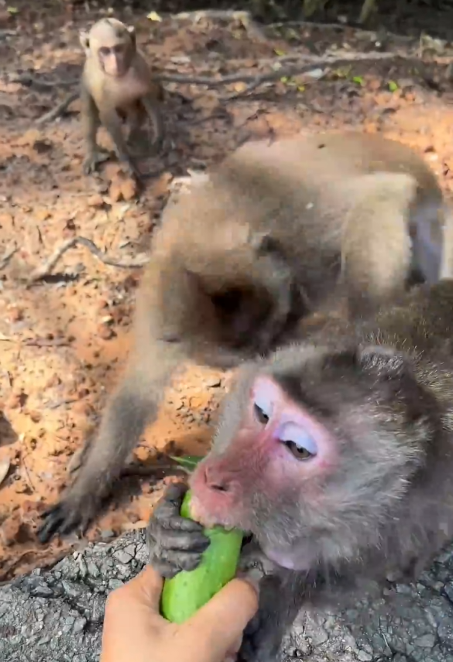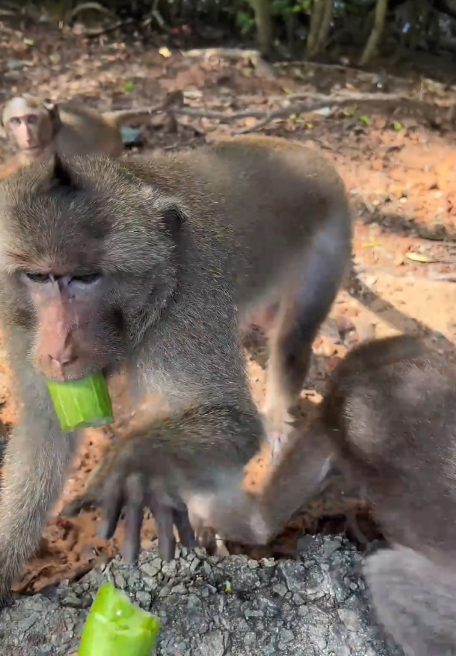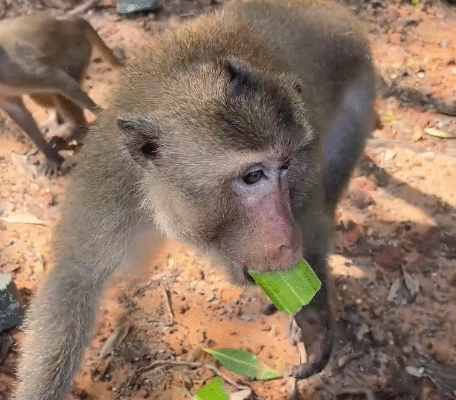
In the bustling world of a monkey sanctuary, there are countless quirks and eccentricities among the residents, but one thing is certain: cucumbers are a universal favorite. You wouldn’t expect a vegetable so cool, crisp, and simple to inspire such excitement, yet for the monkeys, cucumbers are nothing short of magical. From the moment a fresh cucumber enters their enclosure, the air is filled with squeals, chatter, and chaotic anticipation.
It usually begins in the early morning, when caretakers arrive with baskets of fresh produce. Bananas, apples, carrots — these are all appreciated, of course, but cucumbers bring a special kind of energy. The monkeys seem to recognize the long, green vegetable instantly. There’s a distinct squeak, a twitch of the tail, and suddenly a group of monkeys is darting toward the food area as if propelled by invisible rockets. It’s impossible not to laugh at the sight — one moment the monkeys are lounging lazily, and the next, they’re a whirlwind of fur and energy, all fixated on a humble cucumber.
Watching their approach is fascinating. Some monkeys, especially the younger ones, try to snatch a cucumber in mid-air if it is tossed gently toward them. They leap with surprising precision, tails curled for balance, and sometimes collide mid-flight with a sibling, producing a dramatic tumble that ends with both rolling on the ground, cucumber in paw. Meanwhile, the more experienced monkeys wait patiently, eyes fixed on the prize, calculating the perfect moment to strike. Their movements are a mix of comedy and strategy — an instinctive balance honed over years of observing food distribution.
Once a cucumber is in hand, the excitement only grows. Some monkeys hold it delicately, inspecting the vegetable as if appreciating its texture before taking a bite. Others dive in immediately, crunching down with impressive gusto. There is no subtlety here — the crisp sound of teeth breaking through the cucumber resonates across the enclosure, drawing more monkeys to the scene. Each bite seems to bring renewed energy, squeals of delight, and an eagerness for the next one.
It isn’t long before cucumbers spark playful chaos. One monkey may decide that a sibling’s cucumber looks better than their own, prompting a light-hearted chase through the trees. You might witness a small acrobatic competition as monkeys leap from branch to branch, cucumber in paw, squealing and tumbling, all in the name of securing the most prized piece. Observers often laugh uncontrollably at the sight — it’s impossible to resist the infectious joy of cucumber-induced antics.
Even the older, more reserved monkeys cannot resist the allure of cucumbers. Some approach slowly, choosing a quiet corner to savor their vegetable without distraction. Yet, even they are not immune to the excitement. A sudden squeal, a flying cucumber, or the sight of a young monkey performing an impressive acrobatic move can draw them into the frenzy. Before long, they, too, are bounding through the enclosure with a cucumber clenched tightly, a mischievous sparkle in their eyes.

Caretakers often use cucumbers as both treats and training tools. Because monkeys respond so enthusiastically, cucumbers become an effective reward for completing enrichment tasks, navigating obstacle courses, or engaging in social learning exercises. For instance, a monkey may be asked to manipulate a puzzle feeder to retrieve a cucumber, testing both problem-solving skills and patience. The sight of a monkey finally obtaining its prize after working through the challenge is priceless — squeals of victory and triumphant bites follow immediately, often accompanied by excited displays of jumping, tail flicking, and even playful squeaks directed at nearby companions.
Cucumbers also foster social interactions among the troop. Sharing is a common occurrence, particularly among younger monkeys. One monkey may nibble a cucumber while offering a piece to a sibling or friend. Sometimes, disputes arise — a mischievous monkey may try to steal a cucumber from another — but these conflicts are usually playful, brief, and resolved quickly, often with laughter-inducing tumbles or acrobatic maneuvers. In this way, cucumbers serve not only as nutrition but as catalysts for social bonding, play, and skill development.
Interestingly, monkeys exhibit unique personalities in how they approach cucumbers. Some are methodical, taking tiny bites and savoring the crisp texture, while others are entirely impulsive, chomping down with gusto and racing off to hide their prize. There are the “chefs” of the troop, who attempt to peel the cucumber or bite it in precise sections, and the “gluttons,” who devour their entire cucumber in seconds, squealing loudly in delight. These individual quirks add layers of amusement and fascination for anyone observing.
The sensory experience is equally remarkable. The coolness of the cucumber is refreshing, especially on warm days. The crunch resonates in the forest, and the smell, though subtle, seems to entice even the most distracted monkey. It is as if the cucumber has a magic quality, capable of transforming a mundane day into a carnival of energy and amusement. Every monkey reacts differently, yet all respond with enthusiasm, creating a symphony of squeaks, laughter-like sounds, and movement.

Feeding time often becomes a full-blown performance. The enclosure transforms into a stage, where each monkey plays a role — from the bold leaders leaping to the highest branches to claim the largest cucumbers, to the cunning strategists who wait patiently for the perfect moment, to the tiny acrobats tumbling and squealing as they snatch their portions. The humans watching can only stand in awe and amusement. Every day brings new antics, new challenges, and new forms of chaos. No two cucumber feeding sessions are ever the same.
By mid-afternoon, the frenzy begins to settle. Monkeys retreat to quieter areas, munching contentedly on any remaining cucumbers, grooming one another, or simply lying in the sun with their prize in paw. Some carry their cucumbers to the edge of the enclosure, nibbling in solitude, while others continue to playfully tease siblings, ensuring the final moments of the cucumber feeding experience are just as joyful as the first.
Even after the cucumbers are gone, the energy lingers. Squeals and chirps continue, partly from play and partly from the shared joy of a communal feast. Observers often leave with a smile, having witnessed a display of raw, playful energy that is at once chaotic, funny, and heartwarming. Monkeys, in their love for cucumbers, remind us of the simple joys in life — the delight of a crisp bite, the thrill of sharing, and the exhilaration of playful chaos.
In the end, cucumbers are more than just a vegetable in a monkey sanctuary. They are a catalyst for laughter, learning, and connection. They bring out personality quirks, foster social bonds, and transform ordinary days into memorable adventures. And while the chaos may be wild, it is a beautiful testament to the monkeys’ intelligence, playfulness, and zest for life.
So next time you think of cucumbers as a simple snack, remember the monkeys. For them, cucumbers are not just food — they are a source of joy, mischief, and uncontainable energy. Observing their antics, you cannot help but laugh, marvel, and appreciate the extraordinary world of monkeys and their hilarious, chaotic, cucumber-fueled adventures. 🐒🥒🤣



